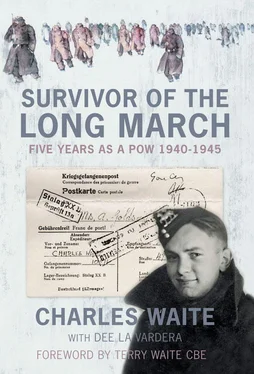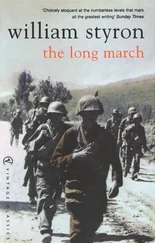So everybody tried to keep things on an even keel. None of us prisoners wanted to step out of line as it could have repercussions for everybody else. The guards didn’t want any trouble as that could reflect badly on them and they wanted so stay on at the camp because they were out of harm’s way. So we put up with things. But sometimes, once in a while, it didn’t take much to tip you over the edge.
Every day started and ended the same: thinking about food from the moment you got up to when your head hit the straw mattress at night. You were looking forward to each meal, whatever you were given, hoping there might be something different or a little bit more. Mug of coffee for breakfast, thin, greasy soup for lunch, and a piece of bread and butter and a slice of bratwurst, if you were lucky, for supper. Play cards. Darn your socks. Write a letter. Go to bed hungry. Always the same.
Except that day. I will always remember that particular day as one thing distinguished it from all the thousands of other days spent in exactly the same way.
Mid July. Warm and dry. It was harvest time. That day I was in a different working party. There were eleven of us, including pals Laurie and Jimmy, and we were working on a small farm helping the farmer, his wife and their daughter with the harvest. We were in a hay barn and we were moving sheaves of wheat with pitch forks from one side of a huge barn to the opposite bay. We were giving the hay a good airing so it didn’t rot or get eaten by vermin. I was up top with three others, throwing the sheaves down to the five below, who passed them to the other three in the empty bay. It was hard work and it was hot, and the dust from the wheat got in the back of my throat. We had rolled up our sleeves and tied string round the bottom of our trousers to stop the mice getting up our legs when their nests were disturbed in the wheat. They ran out, babies and adults, all over the place, looking for another safe place to settle.
Good old Jimmy had come prepared. He usually carried an assortment of useful things in his pockets including string which he saved from the Red Cross Parcels. Just the ticket. It was funny though, because you wouldn’t think to look at it that the string was actually made out of brown paper. It was all twisted very, very tightly but if you unravelled it, you would see what it was made of. Of course, it was no good in the rain as it just fell to bits. It was hot and sweaty work but still better than freezing to death in the middle of a field in winter, hacking at sugar beet in the frozen ground with a useless two-pronged hand tool.
A guard came across the farm yard. It was lunch time. You could hear the sound of the hooves and the wheels of the cart on the cobbles coming towards us with our food. The sound of the metal ladle like a reveille, clanking on the milk churn full of soup. I heard a voice shouting something in German, probably, ‘ Los!’ – get going, or ‘Schnell, schnell! ’ – hurry up, to the camp cooks or maybe to us. We stopped work, put down our tools and made our way out of the barn. I wiped my hands on my trousers as I followed the others. As I came round the side of the barn, I could see our chaps struggling to keep the churn upright on the back of the cart.
Soup of the day. Glorious soup of the Fatherland! Soup was all we usually had at midday after a long, hard morning’s work. Hot and wet, maybe a surprise bit of meat or lump of swede, a scrap of beet leaf, but nothing much to recommend it. I couldn’t see anything else on the cart. No bread. No such luck. If you were clever enough, or rather strong enough, you saved a piece from the night before to have with your soup the next day but most of the time you didn’t. It took an iron will not to wolf it down as soon as you got your evening ration.
We always carried our bowls and spoons with us so I went and collected mine where I had left them in the large inside pocket of my overcoat, which was hanging on a post. I went and queued at the cart where one of our chaps was standing ready, ladle in hand. You would have thought it was precious liquid gold the way he was serving it out, taking his time, careful not to spill a drop as the ladle travelled the distance between churn and bowl. ‘Come on, come on. I’m hungry,’ I said.
It was my turn and I held my bowl out with my hand cupped underneath to keep it steady. Didn’t want to lose a drop. Maybe it was special that, I was thinking. Perhaps one of the camp cooks had added a bit of something extra. As it was served out into my bowl, I could feel that the soup was stone cold and I thought that this was rubbish. This was no good. I tipped the bowl forward slightly to look inside and gave the soup a sniff. Terrible. What on earth was in it? Bits of rancid horse meat in a scummy grey liquid. How could anybody serve something like that to another human being? How were you meant to work twelve hours a day on this pig swill?
Now I had a terrible temper, I admit that, and something just went inside me sometimes. I lost all sense of where I was and what was going on around me. I didn’t care that the chap who made the soup was looking at me, worried that I was going to say something. That the fellow before me had already drunk his down in one go. I didn’t care who was standing next to me, behind me or across the yard. I was angry, so angry that I couldn’t stop myself. I walked over to the guard. I didn’t even take in which one it was. I did not care who it was. They were all the same that day.
We had a number of guards who came and went all the time. You marched out in the morning with one lot and by then end of the day there had been two or three changes. There was Hunchback Hans, the one I gave cigarettes to in exchange for a bit of extra bread; Red Face who loved garlic; or the ones we nicknamed Taffy Biscuits because they were all the same, only capable of shouting. ‘ Mach weiter. Mach weiter.’ – do more, do more, when we were working. You know – sounds like McVite, Mcvite’s Biscuits, so Taffy Biscuits. Oh, never mind. And there was Jan who didn’t like the English and me in particular.
So this lunchtime guard was sitting on a wall, his rifle propped up next to him, head down, chewing and sucking his teeth. I walked across to him.
‘Look,’ I said, shoving the bowl under his nose, stabbing my finger at the disgusting mess in it. ‘That’s not fit for pigs,’ adding, ‘ Für Schweine ,’ – for pigs, in case he didn’t understand. Then I repeated the word, ‘ Schweine! ‘ and threw the contents of the bowl across the yard. The soup sort of curved up in the air for a second before it landed, splattering across the cobbles, leaving a greasy stain and then seeped away through the cracks. OK, that was done, I had made my point. I imagined that the guard was saying to himself, ‘If you don’t want it, then that’s your loss. You don’t eat it, you go hungry.’ End of story.
So I turned and walked off towards the stables where they kept the farm horses. There was a tap outside where you washed your hands, cleaned your bowl and sneaked a drink if you were lucky. I was bending down to turn on the tap and rinse out my bowl when I heard the guard get up. Now German soldiers wore boots with steel toe caps and heels and I heard the clack, clack sound of his boots on the cobbles coming towards me. Oh God, he was following me.
I straightened up and turned round to face him. It was Jan, it would be, the guard who didn’t like me. He was a very big bloke, over 6 ft tall. He was what was known as einer falsche Deutscher – a false German, half Polish, neither one thing nor the other, I suppose. He had never liked me. Not that I had ever done anything in particular to him. I was English, a prisoner of war and he didn’t like the look of my face. He was coming straight at me now, fixing his bayonet to his rifle, which should have been fixed all the time by their law. He speeded up and when it was finally attached he suddenly lunged at me and caught me in the chest with the bayonet. I felt a sharp pain, which spread across my chest and made me gasp.
Читать дальше




![Джеффри Арчер - The Short, the Long and the Tall [С иллюстрациями]](/books/388600/dzheffri-archer-the-short-the-long-and-the-tall-s-thumb.webp)







